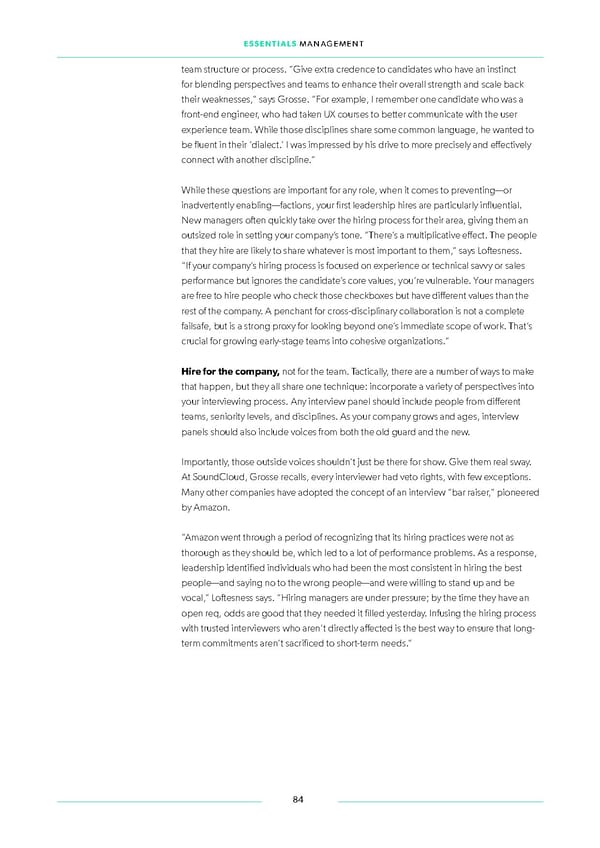ESSENTIALS MANAGEMENT team structure or process. “Give extra credence to candidates who have an instinct for blending perspectives and teams to enhance their overall strength and scale back their weaknesses,” says Grosse. “For example, I remember one candidate who was a front-end engineer, who had taken UX courses to better communicate with the user experience team. While those disciplines share some common language, he wanted to be lfuent in their ‘dialect.’ I was impressed by his drive to more precisely and effectively connect with another discipline.” While these questions are important for any role, when it comes to preventing—or inadvertently enabling—factions, your ifrst leadership hires are particularly inlfuential. New managers otfen quickly take over the hiring process for their area, giving them an outsized role in setting your company’s tone. “There’s a multiplicative effect. The people that they hire are likely to share whatever is most important to them,” says Lotfesness. “If your company’s hiring process is focused on experience or technical savvy or sales performance but ignores the candidate’s core values, you’re vulnerable. Your managers are free to hire people who check those checkboxes but have different values than the rest of the company. A penchant for cross-disciplinary collaboration is not a complete failsafe, but is a strong proxy for looking beyond one’s immediate scope of work. That’s crucial for growing early-stage teams into cohesive organizations.” Hire for the company, not for the team. Tactically, there are a number of ways to make that happen, but they all share one technique: incorporate a variety of perspectives into your interviewing process. Any interview panel should include people from different teams, seniority levels, and disciplines. As your company grows and ages, interview panels should also include voices from both the old guard and the new. Importantly, those outside voices shouldn’t just be there for show. Give them real sway. At SoundCloud, Grosse recalls, every interviewer had veto rights, with few exceptions. Many other companies have adopted the concept of an interview “bar raiser,” pioneered by Amazon. “Amazon went through a period of recognizing that its hiring practices were not as thorough as they should be, which led to a lot of performance problems. As a response, leadership identiifed individuals who had been the most consistent in hiring the best people—and saying no to the wrong people—and were willing to stand up and be vocal,” Lotfesness says. “Hiring managers are under pressure; by the time they have an open req, odds are good that they needed it iflled yesterday. Infusing the hiring process with trusted interviewers who aren’t directly affected is the best way to ensure that long- term commitments aren’t sacriifced to short-term needs.” 84
 Essentials Management First Round Capital Page 83 Page 85
Essentials Management First Round Capital Page 83 Page 85